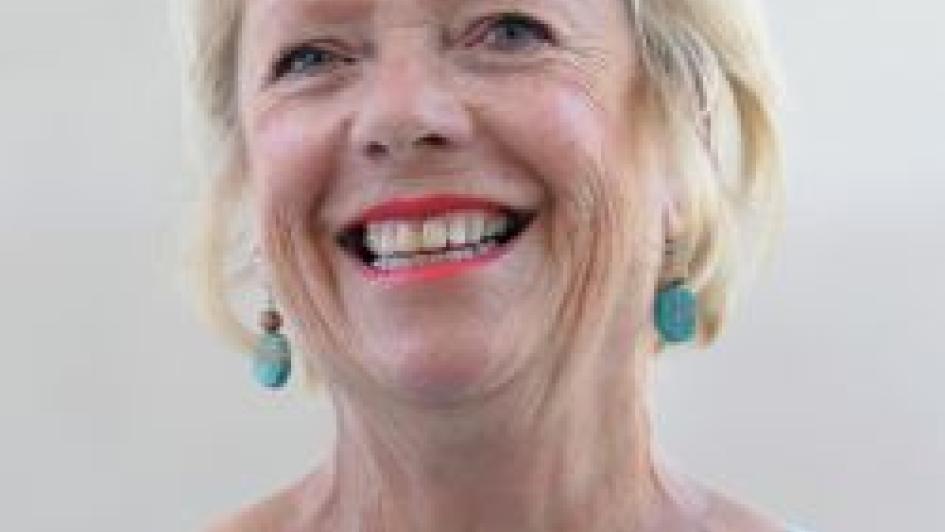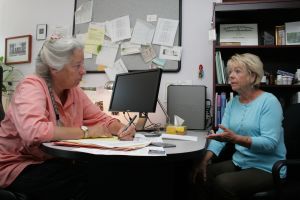Stage 4 to Cancer-Free: Patient Thanks Bastyr for Role in Holistic Care

Published
Sharon Hanson was given three months to live. She had pancreatic cancer, which carries one of the lowest survival rates of all cancers. It was discovered too late for any treatment except a last-ditch blast of chemotherapy. Get your affairs in order, the oncologist said. Write a letter to your grandkids.
The mention of grandchildren lit a spark in her. Her husband died just two months after her diagnosis, and Hanson said to herself: "My kids and grandkids are not going to lose two of us so close. That's not going to happen."
She wanted a second opinion from an integrative oncologist — someone who could advise cancer patients on both conventional medicine and naturopathic therapies. She went to Leanna Standish, PhD, ND, LAc, FABNO, one of Bastyr University's leading cancer care researchers, practitioners and teachers.
As a research professor, Dr. Standish reviewed results from all of the cancer treatment centers around the area. She'd been tracking impressive results from Ben Chue, an oncologist who ran an unconventional center in Seattle. Go see Ben Chue, Dr. Standish said.
That was five years ago. This fall, tests show that Hanson is cancer-free, a remarkable victory against one of the deadliest forms of cancer. It's all the more unlikely considering Hanson's cancer was diagnosed as stage 4 and had spread to her lungs, liver and lymph nodes. She credits her turnaround to the pioneering approach of Dr. Chue and the Bastyr graduates on his staff. They did several important things, she says.
The Party Room
First, they gave her hope. "Dr. Chue said, 'There's no limit to your time,'" Hanson, 68, recalls. "'Nobody knows. We'll try something, and if it doesn't work, we can try something else.' That's when I felt like I'd make it."
Second, Dr. Chue and his staff offered a welcoming environment that recognized the connection between mental and physical health. His practice at the time on Seattle's Capitol Hill greeted patients with bamboo, warm colors and designs informed by feng shui (last spring Chue opened a new clinic, Lifespring Cancer Treatment Center, in the Eastlake neighborhood). Treatments were given in a light-filled a space known as "The Party Room," where patients gathered to share stories and notes and frequently laugh. The relaxing, supportive circle made Hanson's weekly appointments there her favorite days of the week, she says.
The naturopathic physicians on Dr. Chue's staff also provided botanical therapies to help Hanson deal with side effects and boost her immunity. She took glutamine to protect against nerve damage. She took cold-pressed sesame oil to raise her platelet counts. Hanson didn't feel the need for acupuncture or yoga to deal with pain, but many patients found them helpful.
Low-Dosage Chemotherapy
Finally, and most controversially, Dr. Chue administered chemotherapy in much lower doses than most cancer doctors use. "Traditional chemotherapy uses the highest dosage a person can stand," he says. "But you have to wait for a person to recover or you'll kill them."
Chemotherapies were first developed for chemical warfare, after all. They attack healthy cells along with dividing tumor cells, leaving patients with significant side effects such as nausea, vomiting, diarrhea, hair loss, reduced immunity to disease and even heart complications. So patients typically receive treatments no more than every three weeks.
By contrast, Dr. Chue gives patients like Hanson doses every week, but at one-half or one-third the usual dose. He's found that patients experience much milder side effects and are able to receive more treatment in total.
"Because we're not destroying the immune system with high-dose chemotherapy, it can continue to function to help fight the cancer," he says. "It also lets us give doses more frequently. That frequency turns out to be terribly important."
Dr. Chue began using the approach 14 years ago, before clinical trials had studied it. Other oncologists were intensely skeptical. Since then, Dr. Chue's method has found widespread acceptance at cancer centers, says Dr. Standish.
"In the past, he was ridiculed for it," says Dr. Standish. "But it's what many of us now believe is the best way to do chemo. It's become a common method."
The Value of Hope
Hanson credits the low-dosage chemo, combined with Dr. Chue's integrative care, with saving her life. Today she enjoys living in Shoreline near her two children and two grandchildren. She helps run the family's longtime hair salon in Bellevue. She knows that not all cancer patients are as fortunate as her, but she believes they can benefit from the approach that served her so well.
And as Bastyr works to reshape cancer care through its Integrative Oncology Research Center (BIORC), it is looking to learn from patients like Hanson. BIORC combines chemotherapy with naturopathic therapies such as botanical medicine and acupuncture, and it's in the midst of a $3.1 million clinical study with the Fred Hutchinson Cancer Research Center to compare integrative cancer treatment with conventional care. Another new study of medicinal mushrooms is expanding BIORC's scope to include prostate cancer along with its current focus on breast cancer. In all of this, Hanson's story illustrates an important point about health and hope, says Dr. Standish, BIORC's medical director.
"The last two generations of conventional doctors were taught to give statistics and timeframes," she says. "They're taught not to instill hope. The whole idea is to consider advanced-stage cancer a doomsday diagnosis and avoid giving patients false hope."
But what if there's no such thing as "false hope"?
"Hope is hope," says Dr. Standish. Whether rational or not, it can give patients the will-power necessary to return to health.
Healers have a responsibility to tell patients when they are dying and help them prepare for death, she says. But an integrated mind/body perspective, she adds, allows a doctor to recognize that Hanson's determination to survive for her grandkids matters, no matter how sick she is.
Emotional Reunion
 In August 2011, Standish and Hanson met for the first time since their life-altering visit five years ago. On a balmy summer morning, they embrace with a hug and sit in Dr. Standish's office at Bastyr's campus in Kenmore to catch up. Sharon's son Matt, who accompanies her to all her doctor's appointments, joins them.
In August 2011, Standish and Hanson met for the first time since their life-altering visit five years ago. On a balmy summer morning, they embrace with a hug and sit in Dr. Standish's office at Bastyr's campus in Kenmore to catch up. Sharon's son Matt, who accompanies her to all her doctor's appointments, joins them.
"I think you realize what an extraordinary case you are," Dr. Standish says.
Hanson nods, her face beaming. She wants everyone to know about the potential of integrative therapies. She encourages anyone diagnosed with cancer to see an integrative medicine specialist before committing to a treatment plan.
"We need to seek out every patient that has been diagnosed," he says. "There are more integrative ways of treating this disease rather than big doses of chemo alone. We want to get that word out."
Matt Hanson has become a volunteer regional leader of the Pancreatic Cancer Action Network to help reach other pancreatic cancer victims.
After the conversation, Hanson toured BIORC's facility on campus. She learned about the approach similar to Dr. Chue's, which understands that patients require support for their spirit and mind along with their body.
As she met the staff, she eagerly recounted her story. Three months to live. It had spread to my liver and lungs. That was five years ago. Now I'm cancer-free.
The Pancreatic Cancer Action Network, which Hanson and her son Matt support as volunteers, hosts its PurpleStride Puget Sound fundraiser and day of inspiration, on Sunday, Nov. 6, at Seattle's Magnuson Park. Find more information here to participate or volunteer.

